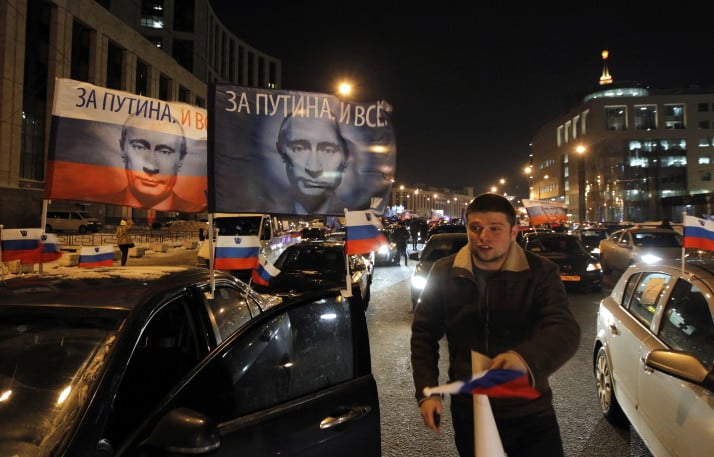
Watching Russian TV recently is a disturbing business. As Stephen Ennis at BBC Monitoring has painstakingly recorded, Russian media has developed a habit of delivering death threats to opposition members, using anti-Semitic insinuations against its opponents, screaming about the threat of the “homosexual sodomite tsunami,” and recommending burning the hearts of homosexuals while indulging in “techniques of psychological conditioning designed to excite extreme emotions of aggression and hatred in the viewer.”
It has helped “hallucinate a war into reality in Ukraine” (the Economist’s phrase) with fabricated scare stories about Ukrainian militia crucifying ethnic Russian children, “fascist Juntas” taking power in Kiev and U.S. plots to engineer ethnic cleansing in Donbas, while launching targeted, untrue and vicious attacks on Western academics in Russia as “fifth columnists” (I could go on — but you get the idea).
Zhanna Nemtsova, the daughter of murdered politician Boris Nemtsov, blames Kremlin TV for the death of her father: “Russian propaganda kills,” writes Nemtsova, “it kills reason and common sense but it also kills human beings.”
But here’s the odd thing. In between the frothing rants against the evil West, Kremlin television is full of ads for IKEA, Procter and Gamble and Mercedes, while the rest of the TV schedule is rammed with Russian versions of Western reality shows licensed from British and American production companies. Kremlin TV’s anti-Western hate-speech is financially propped up by Western advertising, and relies on the success of TV formats bought from Western producers.
“If you really want to hurt Russian propaganda consider putting moral pressure on Western advertisers and production companies to stop cooperating with the Kremlin’s hate-channels,” advises USC Annenberg scholar Vasily Gatov.
Gatov was once head of development at the Russian version of Associated Press, RIA Novosti, and understands the system’s weaknesses and the mindset of the people who run it.
“Currently the EU has decided to concentrate on myth busting Kremlin disinformation,” Gatov says. “That means you’re always stuck inside the narratives the Kremlin sets, and is just the sort of game the Kremlin wants to play. What the people who run the Kremlin’s propaganda really worry about is their financial model — not bullshit PR battles. At the end of the day the West can’t say it fears Russian propaganda as a security threat — and then welcome Russian channel heads as clients of honor at TV fairs in Cannes.”
Rather than be shut off behind a Berlin Wall in some parallel socio-economic universe, this Russia is deeply integrated with the global financial system. The elite moves its money, both legal but often illicit, through the off-shore havens of the British Virgin Islands and Jersey and on to London and Geneva.
Vladimir Putin might like to posture about how Russia can divorce its finances from the West — but the reality is the amount of money flowing out of Russia is only increasing; the Kremlin is throwing all its efforts into stopping financial sanctions which cut Moscow off from global markets; there is a whole sub-culture of Western lawyers helping sanctioned Russian “patriots” in Putin’s entourage move their money from Mother Russia to Luxemburg or London.
“If you really want to hurt Russian propaganda consider putting moral pressure on Western advertisers and production companies” — Vasily Gatov
“Want to change something?” asks Gatov. “Then start enforcing your own laws on money laundering. Expand the list of sanctioned Putin cronies — while simultaneously offering easier visas, employment and education opportunities in the West for those many Russians who are not part of the kleptocracy but want to be part of the greater world.”
Gatov’s points underline how very 21st century the questions posed by the Putin regime are. Sometimes one hears the current troubles described as a “Cold War,” with a need for “Detente,” “Finlandization,” “Containment” or other labels plucked from the heyday of 20th century superpower confrontation. Some of these terms might be perfectly useful in their own right, but taken together they risk creating a narrative that clouds the real issues and only helps Putin.
The Kremlin isn’t some alien model on a messianic mission — it’s a very naughty 21st century regime surfing the worst trends of the West: media and market manipulations. But that doesn’t make the challenge it poses any less troubling — in fact, it makes it more so. If the Kremlin were the only actor out there mutating journalism into a weapon and using the global financial system as a huge money laundering machine then it would be easy to fend off: media and markets would be morally robust enough to handle one bad player. Sadly they’re not. It’s precisely because the Kremlin is going with the grain of all that is worst in the system that one should be alarmed.
This is not to say that the Putin problem could be magic-ed away with a few court cases and ethical sanctions campaigns. Thousands have died in Ukraine, in battles which sometimes resemble something out of World War I. There are real security threats, both hard and soft, to contend with in Russia’s near and not so near abroad (the Kremlin can be a little vague on where exactly its “zone of privileged interest” ends), which will take unity and diplomatic wiles.
But even the war the Kremlin is waging has a very 21st century flavor.
The Kremlin’s mix of covert military operations, disinformation onslaught and diplomatic denial has been nicknamed “hybrid war,” “special war” and “full-spectrum conflict.” Much of it is nothing new. A brief flick through Anne Applebaum’s “Iron Curtain” shows how many elements of Putin’s annexation of Crimea repeat the take-over of Eastern European states after World War II: mysterious forces hijack government buildings to defend the population from a dreamt up “fascist” threat; quickly followed by a pop-up, pre-determined, pro-Moscow referendum before the Kremlin takes complete control.
What has changed, in the perceptive phrasing of NYU Professor of Global Affairs Mark Galeotti, “is the world in which hybrid war happens.” In the 21st century the Kremlin can use all the levers of globally integrated economics: “The soldiers of this war are spies and criminals,” writes Galeotti, “cynical lobbyists and gullible commentators, businesses desperate to make a profit from Russia.”
Seen from this point of view, much of what has been termed “hybrid war” could be regarded as the dark flip side of globalization: Interconnectedness doesn’t instantly mean world harmony, it also means we can all mess with each other to an unprecedentedly insidious extent.
Whatever this is, it isn’t the Cold War — but by framing the issues in the old terms one ends up playing right into the Kremlin hands. Putin’s aim is to define today’s Russia as some sort of equal-sized “Other” to the West, as Communism was to Democracy, thus augmenting the optics of his own importance and making his regime seem greater than it is.
Domestically much of Putin’s rule rests on convincing Russians he is the biggest show in town, and the bigger he can look on the global stage the longer he can keep the domestic conversation away from social and economic realities. In foreign affairs his aim is to make Russia look like a gigantic superpower others have to bend their knee to. Thus his need to generate the posters and postures of global confrontation complete with demands for a new Yalta, Rejkjavik or, God-forbid, Cuban Missile Crisis. When top U.S. generals say they believe Russia is the biggest existential threat to the U.S., they risk doing Putin’s propaganda work for him.
But of course it’s not only Putin who enjoys this story.
Hawkish Western politicians get the chance to channel the “Ich bin ein Berliner”-era Kennedy or the early Reagan and make big speeches about being tough on Moscow. Dovish ones can cast themselves as reincarnations of a later Reagan or Brandt, whose insight stands between us and the next world war. Intellectuals pose as new George Kennans or George Bernard Shaws. Media get an easy story about a familiar bad guy — exactly the front page role the Kremlin is trying to fill. Generals get (at the very least) a sound-bite.
There’s something to gain for everyone by playing bit parts in Putin’s Cold War Soap Opera.
Peter Pomerantsev, a senior fellow at the Legatum Institute, is the author of “Nothing Is True and Everything is Possible: The Surreal Heart of the New Russia” (PublicAffairs, 2014).
By Peter Pomerantsev, Politico





